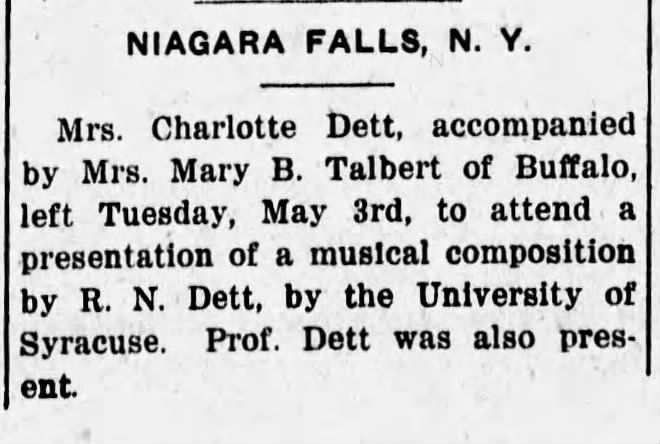
Charlotte W. Dett
Charlotte Dett was a trailblazer through her community leadership, activism, and involvement in the black woman's club movement.
Charlotte Washington Dett was born in 1862 in Drummondville, Canada (Niagara Falls, Ontario today) and moved to Niagara Falls, NY in 1893. Her mother, Harriet Washington, may have escaped from slavery on the Underground Railroad, which was very active in Niagara Falls, NY given its proximity to the Canadian border. Charlotte Dett not only lived on both sides of an international border, she also successfully navigated and trailblazed the borders of gender and race, as well as the public and private spheres.
When she was 18, Charlotte married Robert Dett, a Pullman railroad porter. They had four children but only two lived to adulthood. Samuel was the first African American post office worker in Niagara Falls, NY, and Robert Nathaniel was a famous composer. Charlotte also had musical talent; she was educated and could read and write.
By 1900, Charlotte and Robert had separated. To provide for her sons, Charlotte established a 17-room boarding house in Niagara Falls, NY. The boarding house was near the Falls, so it attracted tourists from all over the world. It “also catered to the African American market” who were “unwelcome at the white-owned hotels in town.” As the tourist industry and black population grew in Niagara Falls, Charlotte’s business became even more successful. She was the sole proprietor for over 30 years.
Like many African Americans in the early 1900s, Charlotte was a Republican because it was President Abraham Lincoln and his Republican administration that abolished slavery. In the 1920s, she formed a political club to encourage locals to vote for the Republican ticket and she organized a local political rally “that featured noted black suffragist, Addie Hunton from Brooklyn.”
Charlotte was actively involved in civic affairs, including city planning discussions, the 1932 Peace Heroes Memorial Service, and the charitable GoldenRod Sewing Club. She was instrumental in establishing the Niagara Community Center, where she instituted “uplifting programs and activities'' and “served as a role model” for its African American patrons.
Charlotte participated in the African American Women’s Club Movement. She joined the Empire State Federation of Colored Women’s Clubs and was elected vice president in 1913. “She also served at least two terms as Chairman of the Executive Committee of the National Association of Colored Women […]. Through these organizations she championed women's suffrage, honored Harriet Tubman, and preserved the home of Frederick Douglass.”
In Niagara Falls, her club work often focused on young women and girls as evidenced by her founding of the Junior League Auxiliary of the Women’s Federation and the Phillis Wheatley Club.
Charlotte networked with many famous African Americans like her good friend and fellow suffrage activist Mary Talbert, educator Mary MacLeod Bethune, and William Pickens of the NAACP. She also lodged tenor singer Roland Hayes and Tuskegee Institute president Robert Moton. She made these connections as the entrepreneur of a boarding house, as the mother of a famous composer, and as a local and national activist.
Throughout her life, Charlotte Dett “worked hard and steadily on issues of self-help, voting, […] political participation, racial unity, equality and fairness, and upward progress of African American women.” She died in 1937 and was buried in Fairview Cemetery in Niagara Falls, Ontario. In 1943, the Niagara Community Center established the Charlotte W. Dett Club in her honor.
Hope L. Russell, Ph.D.

